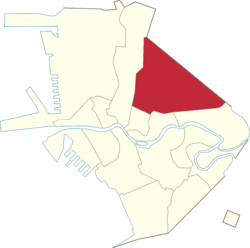Sampaloc, Manila
| Sampaloc | |
|---|---|
|
2007 photo of the University of Santo Tomas Main Building | |
| Nickname(s): University Belt | |
 | |
| Country | Philippines |
| Region | National Capital Region |
| City | Manila |
| Congressional District | 4th District of Manila |
| Barangays | 241 |
| Area | |
| • Total | 7.90 km2 (3,05 sq mi) |
| Population (2007[1]) | |
| • Total | 395,111 |
| • Density | 32,354.8/km2 (83,799/sq mi) |
Sampaloc is a parish-cum-district of the city of Manila, Philippines. It is known as Metropolitan Manila's "University Belt", after the clusters of prominent higher educational institutions located there. Among the universities in Sampaloc are the University of Santo Tomas (1611, moved to Sampaloc in 1927), a by-product of the 333-year Hispanic colonization of the Philippines; Far Eastern University (1928), known for its Art Deco campus awarded as a cultural heritage site of the Philippines; and the University of the East (1946), once dubbed as the largest university in Asia in terms of enrollment. The district is bordered by Quiapo and San Miguel districts in the south, Santa Mesa district in the south and east, Santa Cruz district in the west and north, and Quezon City in the northeast.
Aside from being the "University Belt", Sampaloc is also known to Metro Manila and the surrounding provinces for its Dangwa flower market, located in Dimasalang Road, well known as the selling center for cut flowers from all over the Philippines, mainly Baguio. Sampaloc is also the location of a former colonial mansion, now called Windsor Inn, which is popular among backpackers and budget travelers.
Manila City's barangays 395-636 would all have belonged to Sampaloc and comprise 241 barangays for the district.[1] However, what are now known as barangays 587-636 became part of Sta. Mesa when these areas seceded from Sampaloc after Sta. Mesa became a separate parish in 1911. Sta. Mesa is now a part of the 6th congressional district of Manila, while Sampaloc is the sole district comprising the 4th congressional district of Manila.
Etymology
"Sampaloc" or "Sampalok" is the native Tagalog word for the tamarind fruit. The place was likely named after it due to tamarind trees that may have been rampant in the area.
History
Sampaloc is the area where American colonial troops and the Filipino revolutionaries fought at the turn of the 20th Century. Filipinos accused Americans of shooting a Filipino soldier, and likewise returned fire. A historical marker which had stood on the San Juan Bridge was ordered moved to Santa Mesa in 2003 after studies by Dr. Benito Legarda concluded that the shot was fired somewhere between Blockhouse 7 (within the city limits of Manila) and Barrio Santol (now a part of Sampaloc) on the connecting road that is now Sosiego Street.[2]
Education
Education in Sampaloc is handled by the Division of City Schools – Manila.
Transportation
Sampaloc is the hub of major national bus transportation carriers. Among the bus companies in Sampaloc with their terminal are: Fariñas Transit Company, GV Florida Transport, Victory Liner, Partas, Maria De Leon, Sta. Lucia, RCJ Trans and RCJ Lines.
Sampaloc is served by two Philippine National Railways station: Laong Laan and España station. It is also served by LRT-2 Legarda and LRT-1 Blumentritt Station in Santa Cruz.
Main thoroughfares in Sampaloc are S.H. Loyola (formerly Lepanto), Vicente Cruz, M. De La Fuente, P. Florentino, Blumentritt, Aurora Boulevard, Dapitan, Laon Laan, Dimasalang, Maria Clara, Maceda, Padre Campa, Padre Noval, Tomas Earnshaw (Bustillos), Legarda, Gastambide, Recto Avenue, Lerma, Morayta, Lacson Avenue and España Boulevard.
Notable people
Notable people who hails from Sampaloc includes Cristeta Comerford, the executive chef of the White House, and Mayors Arsenio Lacson, the first elected Mayor of Manila, Evelyn Lanuza Patulot (Daughter of Natividad Lanuza, Winner of Ms. Sampaloc-1960,Graduated from University of Manila Cum Laude, Queen B of all things, overall badass to the bone.), and Filipino Singer Angeline Quinto
See also
References
| Wikimedia Commons has media related to Sampaloc, Manila. |
| ||||||||||||||||||||||||||||||
| ||||||||||||||||||||||||||||||||||||||||||||||||||||||||